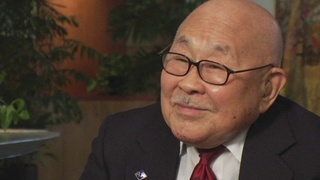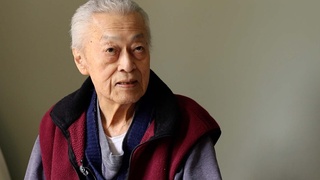Interviews
Japanese Canadians get the right to vote in 1949
Well, to begin with, that was... until, see, up until, they kept the War Measures Act and the restrictions on Japanese up going until 1949. In '49, they finally, after pressure, they had to allow Asians to become, Canadian-born Asians to become citizens. Prior to that point, the B.C. government were able to have some control over this by denying the local Japanese at that time -- even though you were, as my father was a naturalized Canadian, he was not allowed to vote. So he didn't have the vote, and as a result of local elections, not being allowed to vote in B.C. also negated the fact that he was not on the voter's list in the federal government, too. They also followed that rule that no Asian would be allowed to vote in the federal election, the government of Canada election. Well, that all went by the board, and so that, in 1949, they had to allow everyone, and even up, just before that, they had been, the Indians themselves, the aborigines had been denied the vote, and they had to give them the vote after World War II, because they couldn't justify saying that they were not Canadians, 'cause they were all born in Canada. So they had to give them the vote. It became an issue.
Date: July 25 & 26, 2006
Location: Washington, US
Interviewer: Tom Ikeda
Contributed by: Denshō: The Japanese American Legacy Project.
Explore More Videos

Influence of Mexican culture after returning from camp
(b. 1943) Japanese American transgender attorney

A conversation with a farmer in Kansas
(b. 1939) Japanese American painter, printmaker & professor

Dancing in Japan as an American, in the US as Japanese
(1918-2023) Nisei Japanese kabuki dancer

Discrimination in San Francisco
(1914–2015) Nisei YMCA and Japanese American community leader

Collection of artifacts depicting racial stereotypes influences art
(b. 1939) Japanese American painter, printmaker & professor

Encountering racial discrimination at a public swimming pool
(b. 1923) Nisei from Washington. Resisted draft during WWII.

His testimony has more credibility because of his race
(1922 - 2005) Former U.S. Army counterintelligence officer

Gender discrimination in education field
(1925 - 2018) Nisei educator from Hawai‘i

Learned what it meant to be called “Jap” in Heart Mountain
(1934–2018) Japanese American designer, educator, and pioneer of media technologies

First impression of New York City during war time
(1915 - 2011) Nisei florist who resettled in New York City after WW II. Active in Japanese American civil rights movement

The day Pearl Harbor was bombed
(1922–2014) Political and civil rights activist.

Not bringing shame to family
(1926 - 2012) Scholar and professor of anthropology. Leader in the establishment of ethnic studies as an academic discipline

Past ties to present situation in Middle East
(1926 - 2012) Scholar and professor of anthropology. Leader in the establishment of ethnic studies as an academic discipline

Didn't have rights that whites had
(1922–2014) Political and civil rights activist.

Californians didn't know about evacuation
(1922–2014) Political and civil rights activist.
